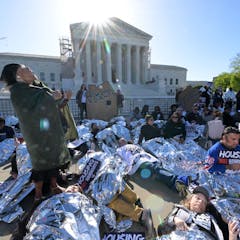
Articles on US Supreme Court
Displaying 1 - 20 of 708 articles

Officials have vowed to keep fighting for permission to open the school as a charter – which would be a controversial first for the country.

Anyone convicted of criminal offences is inadmissible for entry into Canada. But this simple rule may not prevail in the case of Donald Trump.

The supreme court’s latest judgment gives a US president limited immunity from criminal prosecution for acts committed while in office.

The Supreme Court’s decision has major implications for the criminal prosecution of Trump and for the country and how it is governed.

Florida and Texas sought to prevent social media companies from deciding which posts can be promoted, demoted or blocked. The Supreme Court said the tech companies can moderate as they please.

The dissenting judges argued that the Supreme Court’s decision will dramatically expand the president’s powers while in office.

A widely anticipated Supreme Court ruling will sharply limit federal agencies’ power to interpret the laws that they execute and decide how best to carry them out.

What happens if the highest court in the land loses legitimacy?

In a major homelessness ruling, the Supreme Court holds that cities and municipalities can punish people for sleeping outside, even when they have nowhere else to go.

Anti-camping laws are the centerpiece of the ‘hostile design’ strategies cities use to push the unhoused out of public spaces.

The Supreme Court conceded that it should not have taken up the case to begin with.

The company helped spur a public health crisis through its deceptive marketing and aggressive sales of prescription opioids.

Critics are decrying the long time the Supreme Court has taken to rule in a crucial Trump case, charging that it’s politically motivated to help Trump. A scholar of the court says they’re wrong.

The secret recordings of two Supreme Court justices reveal dramatic differences in how they see American political life.

Lawyers, advocacy groups and think tanks are soliciting historians’ expertise on the history underlying certain Supreme Court cases. Yet this history-for-hire approach raises questions.

The opinion did not take on the substance of the plaintiffs’ claims against mifepristone, and the abortion pill is already facing other challenges.

It’s not certain that the ruling will make it harder for fired union organizers to get their jobs back, a labor law professor explains.

The Supreme Court drastically reduced federal protection for wetlands in 2023. Two environmental lawyers explain how private businesses and nongovernment organizations can help fill the gap.

Secret recordings raise questions about Justice Alito’s impartiality, but they also reveal the weak state of legal protections against the misuse of the microphones and cameras everyone carries.

Anti-camping laws are the centerpiece of the ‘hostile design’ strategies cities use to push the unhoused out of public spaces.





